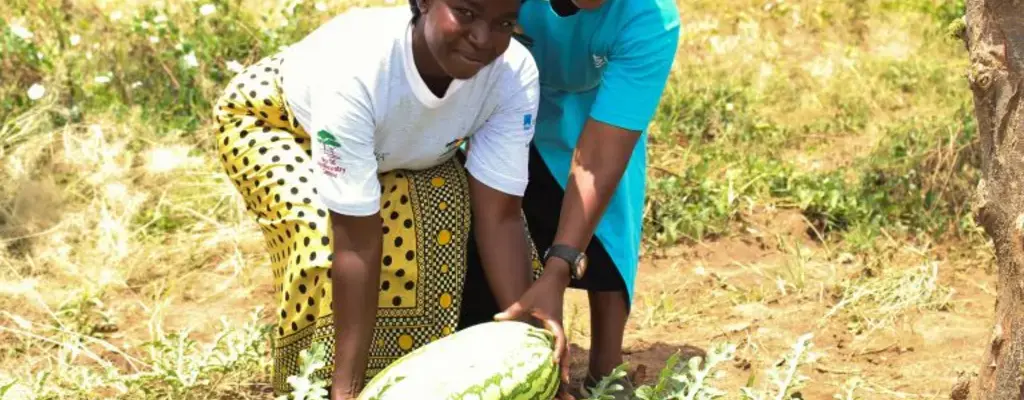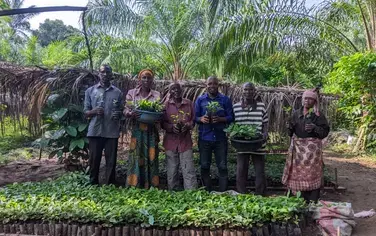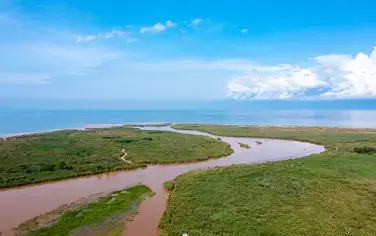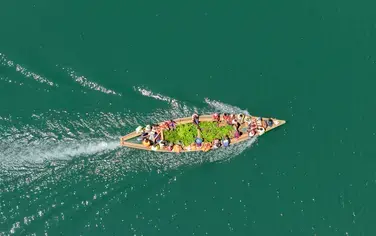This blog is from our partners at the World Agroforestry Centre (ICRAF). See the original here.
Water shortage occasioned by prolonged drought has been a major hindrance to growth of the agribusiness sector in the drylands of Kenya. The Drylands Development (DryDev) programme aims to reverse this trend by assisting smallholders to harvest rainwater for crop production through construction of simple farm ponds.
DryDev is led by the World Agroforestry Centre (ICRAF) in partnership with five national lead organizations and 13 implementation partners in Burkina Faso, Ethiopia, Kenya, Mali and Niger. The programme is funded by the Ministry of Foreign Affairs of the Netherlands, with substantial contribution from World Vision Australia.
The programme has adopted the farm-pond initiative to disseminate a package of interventions: building capacity in agricultural commodity production, on‐farm water and soil management, enhanced access to markets and links to financial services. To maximize benefits from the ponds through integrated systems, DryDev trained farmers’ groups in agroforestry.
“Some farmers established tree nurseries using water from the ponds,” explained Eric Wanga, DryDev manager for Kitui County, from Adventist Development and Relief Agency (ADRA). “This has contributed to enhancing community access to tree seedlings and, hence, adoption of agroforestry. Agroforestry and farmer-managed natural regeneration conserve water and soil, which improve crop yields. In addition, community groups can establish other enterprises, such as beekeeping, around the farm pond.”
The farm ponds form part of the programme’s interventions that were recently assessed during a joint quality monitoring exercise on 5–6 March 2018 in Kitui County, undertaken by ICRAF, World Vision Kenya, ADRA, SNV and Caritas.
In Kitui, the ADRA helped establish 20 farm ponds, one sand dam and one earth pan in the Lower Yatta sites of Kanyangi and Waita. In addition, 376 hectares now feature climate-smart agricultural practices. DryDev also supported smallholders in adopting alternative water-buffering structures that require less investment than ponds, such as ‘zai’ pits, sunken beds and terracing. This comes against a backdrop of efforts by the Government of Kenya to establish a National Water Storage and Harvesting Authority and the establishment by ICRAF, World Food Programme and other partners of the Billion Dollar Business Alliance, which is expanding the use of integrated farm-pond systems.
“Stabilizing smallholders’ crop yields under the changing climatic conditions in Sub-Saharan Africa requires unique adaptation strategies focused on soil and water management,” explained Maimbo Malesu, ICRAF’s expert on water harvesting. “In-situ technology consists of storing water in areas where it is going to be used. This reduces reliance on rain-fed agriculture by providing water for irrigation in areas where groundwater resources are scarce or inaccessible.”
Thinukya Andu self-help group was among the seven groups visited during the monitoring exercise in Kanyangi. The 30 members mostly produce agricultural commodities, such as green gram or mung bean (Vigna radiata), and engage in table banking (collective savings and loans schemes) and poultry rearing.
Through DryDev, members had constructed a 250 m3 farm pond, complete with an irrigation pump; a sand dam along a nearby riverbed to provide clean water for domestic use; and were trained in rainwater harvesting, micro-irrigation, marketing and access to credit. The harvested water supports horticultural value chains and DryDev builds the capacity of farmers to invest in drought-tolerant value chains.
Mercy Mwangangi, a member of Thinukya Andu, knows only too well the importance of taking calculated risks, one step at a time.
“I was initially a subsistence farmer but through the training offered by DryDev I took the risk of venturing into agribusiness,” she said. “Armed with my new financial literacy skills, I approached a microfinance institution and borrowed Ksh 80,000 (USD 800) to cover the cost of excavating a farm pond. The project supported me to fence the pond and provided a dam liner and shade net.”
Thinukya Andu self-help group was among the seven groups visited during the monitoring exercise in Kanyangi. The 30 members mostly produce agricultural commodities, such as green gram or mung bean (Vigna radiata), and engage in table banking (collective savings and loans schemes) and poultry rearing.
Through DryDev, members had constructed a 250 m3 farm pond, complete with an irrigation pump; a sand dam along a nearby riverbed to provide clean water for domestic use; and were trained in rainwater harvesting, micro-irrigation, marketing and access to credit. The harvested water supports horticultural value chains and DryDev builds the capacity of farmers to invest in drought-tolerant value chains.
Mercy Mwangangi, a member of Thinukya Andu, knows only too well the importance of taking calculated risks, one step at a time.
“I was initially a subsistence farmer but through the training offered by DryDev I took the risk of venturing into agribusiness,” she said. “Armed with my new financial literacy skills, I approached a microfinance institution and borrowed Ksh 80,000 (USD 800) to cover the cost of excavating a farm pond. The project supported me to fence the pond and provided a dam liner and shade net.”
Thinukya Andu self-help group was among the seven groups visited during the monitoring exercise in Kanyangi. The 30 members mostly produce agricultural commodities, such as green gram or mung bean (Vigna radiata), and engage in table banking (collective savings and loans schemes) and poultry rearing.
Through DryDev, members had constructed a 250 m3 farm pond, complete with an irrigation pump; a sand dam along a nearby riverbed to provide clean water for domestic use; and were trained in rainwater harvesting, micro-irrigation, marketing and access to credit. The harvested water supports horticultural value chains and DryDev builds the capacity of farmers to invest in drought-tolerant value chains.
Mercy Mwangangi, a member of Thinukya Andu, knows only too well the importance of taking calculated risks, one step at a time.
“I was initially a subsistence farmer but through the training offered by DryDev I took the risk of venturing into agribusiness,” she said. “Armed with my new financial literacy skills, I approached a microfinance institution and borrowed Ksh 80,000 (USD 800) to cover the cost of excavating a farm pond. The project supported me to fence the pond and provided a dam liner and shade net.”
Thinukya Andu self-help group was among the seven groups visited during the monitoring exercise in Kanyangi. The 30 members mostly produce agricultural commodities, such as green gram or mung bean (Vigna radiata), and engage in table banking (collective savings and loans schemes) and poultry rearing.
Through DryDev, members had constructed a 250 m3 farm pond, complete with an irrigation pump; a sand dam along a nearby riverbed to provide clean water for domestic use; and were trained in rainwater harvesting, micro-irrigation, marketing and access to credit. The harvested water supports horticultural value chains and DryDev builds the capacity of farmers to invest in drought-tolerant value chains.
Mercy Mwangangi, a member of Thinukya Andu, knows only too well the importance of taking calculated risks, one step at a time.
“I was initially a subsistence farmer but through the training offered by DryDev I took the risk of venturing into agribusiness,” she said. “Armed with my new financial literacy skills, I approached a microfinance institution and borrowed Ksh 80,000 (USD 800) to cover the cost of excavating a farm pond. The project supported me to fence the pond and provided a dam liner and shade net.”
Mwangangi adopted water and soil conservation techniques that allowed her to diversify her crop production, cultivating high-value crops such as watermelon, tomato, green gram and cowpea, that accelerated the returns on her investment.
Designing good business plans is a key part of smallholders’ transition from subsistence to commercial farming.
“Once a farmer develops an agribusiness idea, the business plan should begin addressing a number of issues: the institutions that one should engage with, the viable value chains and technologies that should be put in place,” said Ronald Ng’etich, DryDev associate director from World Vision Kenya. “This will motivate sustainability by creating a sense of ownership and involvement.”
According to ADRA, 5515 farmers in Kitui County have received water and soil management training and 8130 were equipped with skills in production of agricultural commodities.




